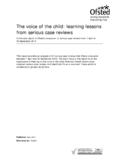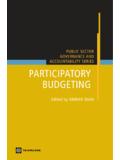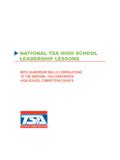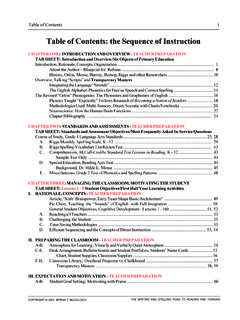Transcription of Implementing an Effective Lessons Learned …
1 2008, Mark Marlin - 1 - Originally published as a part of UTD 2nd Annual Project Management Symposium Proceedings Dallas, Texas Implementing an Effective Lessons Learned Process in a Global Project Environment Mark Marlin PMP Sr. Vice President, Westney Consulting Group Abstract A Lessons Learned Process is one that crosses functional boundaries and allows an organization to learn from both its mistakes and its successes. An Effective Lessons Learned process should prevent us from repeating our mistakes and allow us to repeat our successes. It should be an instrumental part of any organization s overall continuous improvement process.
2 Unfortunately, very few organizations can claim they have an Effective Lessons Learned process that spans their global project operations. This paper discusses the barriers to implementation of an Effective Lessons Learned process as well as the keys to success in overcoming these barriers and having a process that truly adds value to the organization. As with any significant organizational change, the implementation of an Effective Lessons Learned process requires strong leadership and an atmosphere where people are not afraid to admit to mistakes and, in fact, are rewarded for doing so.
3 It also requires that the organization s project management methodologies include processes and procedures that ensure Lessons are captured, validated, institutionalized and utilized on future projects. Introduction Since 1997, I ve taught project management in both the public and private sectors. I always ask my students, How many of you believe you have an Effective Lessons Learned process that covers projects across your entire organization? Seldom, do I ever see a hand go up. And when a hand does go up, and I investigate further, it usually is a process limited to my department or to my business unit or to large special projects.
4 A number of students acknowledge their companies have formal or semi-formal Lessons Learned programs, but they are generally viewed as ineffective. And yet everyone believes an Effective Lessons Learned process is important if an organization is going to be able to continuously improve on its project performance. In fact, in the Project Management Institute s own A Guide to the Project Management Body of Knowledge (PMBOK Guide, Third Edition), the term Lessons Learned appears 63 times, which is no small indicator of the emphasis PMI places on the subject.
5 The PMBOK Guide defines Lessons Learned as The learning gained from performing the project. Lessons Learned may be identified at any point. Learning can come from successes where we did something creative or imaginative and we would like to see it repeated on future projects -- and learning can come from our failures where something failed to meet our expectations and we would like to improve and not make the same mistake again. It would be nice to say most of the learning comes from our successes, but the reality is that most of the learning comes from our failures.
6 In a survey by Ernst & Young of 130 PMI members and guests at a PMI meeting in October 2006, although 91% of the respondents believed Lessons Learned reviews on projects were important, only 13% said their organizations performed them on all projects and only 8% believed the primary objective of the reviews was to understand the benefits that would accrue to the organization. This paper discusses the barriers that prevent Effective implementation of Lessons Learned and the keys to success in addressing these barriers and developing and maintaining an Effective Lessons Learned process that can span the organization and be a valuable contributor to the organization s overall goal of continuous improvement.
7 2008, Mark Marlin - 2 - Originally published as a part of UTD 2nd Annual Project Management Symposium Proceedings Dallas, Texas Overcoming Barriers Barriers to Effective Lessons Learned Below are a few barriers that I think we all recognize. Now let s see how we can deal with and overcome them. Leadership The lack of leadership involvement in and commitment to the learning process is the most critical barrier. (Dressler, 2007, p. 40) An Effective Lessons Learned process means having a disciplined procedure that people are held accountable to follow.
8 It means encouraging openness about making mistakes or errors in judgment. It often means cultural or organizational change, which does not come easy in most organizations. It means leading by example. If management is unwilling to learn from their mistakes, it is unlikely that the rest of the organization will be willing to admit to mistakes. In fact, management must reward people for being open and admitting to making mistakes, bad decisions, judgment errors, etc. This, of course, flies in the face of many corporate cultures.
9 Process Change versus Accountability When something goes wrong on a project, there is someone accountable. One of the biggest problems in Implementing an Effective Lessons Learned process is to separate the accountability issue from the process issue. Accountability is important, but is something to be dealt with by management. Lessons Learned must deal with the process deficiency that caused the problem ( , inadequate procedure, too much of a rush, inadequate training, poor communications, etc.). Once a Lessons Learned process focuses on blame or finger pointing, the process will soon fade into oblivion.
10 What s In It for Me? Lessons Learned captured on a project seldom benefit that project. They benefit future projects. Often, a project manager sees capturing Lessons Learned as simply another chore that provides his or her project with little value, especially if the Lessons Learned procedure is complex, takes a fair amount of resources and time to implement, and management has not provided adequate resources to perform the work. The solution here is to have a simple procedure, ensure projects have the resources and time to implement the procedure, and hold project managers The LL process is too complicated and takes too much time!







